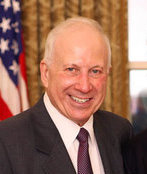
The U.S. Securities and Exchange Commission (SEC) is an independent agency of the United States federal government, created in the aftermath of the Wall Street Crash of 1929. The primary purpose of the SEC is to enforce the law against market manipulation.
Investment banking pertains to certain activities of a financial services company or a corporate division that consist in advisory-based financial transactions on behalf of individuals, corporations, and governments. Traditionally associated with corporate finance, such a bank might assist in raising financial capital by underwriting or acting as the client's agent in the issuance of debt or equity securities. An investment bank may also assist companies involved in mergers and acquisitions (M&A) and provide ancillary services such as market making, trading of derivatives and equity securities, FICC services or research. Most investment banks maintain prime brokerage and asset management departments in conjunction with their investment research businesses. As an industry, it is broken up into the Bulge Bracket, Middle Market, and boutique market.
Corporate governance is defined, described or delineated in diverse ways, depending on the writer's purpose. Writers focused on a disciplinary interest or context often adopt narrow definitions that appear purpose-specific. Writers concerned with regulatory policy in relation to corporate governance practices often use broader structural descriptions. A broad (meta) definition that encompasses many adopted definitions is "Corporate governance” describes the processes, structures, and mechanisms that influence the control and direction of corporations."

The Benjamin N. Cardozo School of Law is the law school of Yeshiva University. Located in New York City and founded in 1976, the school is named for Supreme Court Justice Benjamin N. Cardozo. Cardozo graduated its first class in 1979. An LL.M. program was established in 1998. Cardozo is nondenominational and has a secular curriculum, in contrast to some of YU's undergraduate programs. Around 320 students begin the J.D. program per year, of whom about 57% are women. In addition, there are about 60-70 LL.M. students each year. Cardozo is ranked 52nd in the nation by U.S. News & World Report 2023.
John C. Coffee Jr. is the Adolf A. Berle Professor of Law and director of the Center on Corporate Governance at Columbia Law School.
Lawrence A. Cunningham is an academic, corporate advisor, and author. He is the founder and managing partner of the Quality Shareholders Group. Cunningham is best known as an expert on corporate governance. He is also known for his knowledge of the history and corporate culture of Berkshire Hathaway and Warren Buffett.

Dr. Nasser Saidi is a Lebanese politician and economist who served as the Minister of Economy and Industry and the Vice Governor for the Lebanese central banks for several terms in the last decade of the 20th century.

Samuel J. Heyman was an American businessman and hedge fund manager best known for his longtime chairmanship of the GAF Materials Corporation and International Specialty Products Inc. (ISP).
Paul Lyndon Davies QC, FBA is Allen & Overy Professor of Corporate Law Emeritus at the University of Oxford, Emeritus Fellow of Jesus College, Oxford and Emeritus Professor of Law at the London School of Economics, where he was the Cassel Professor of Commercial Law from 1998 to 2009. He is an honorary Bencher of Gray’s Inn.

Stijn Claessens is a Dutch economist who currently serves as the Head of Financial Stability Policy department of the Bank for International Settlements. He worked for fourteen years at World Bank beginning in 1987 until 2001 where he assumed various positions including that of Lead Economist. Following his tenure at the World Bank he became Professor of International Finance Policy at the University of Amsterdam where he remained for three years and still is on the faculty. Stijn has many distinguished academic publications and his work has been cited in many outlets including The Wall Street Journal, The Financial Times, The Economist, The Washington Post and various other publications and he has appeared in several television programs.
Institute of Corporate Directors (ICD) is primarily an institute of, for and by corporate directors established in the Philippines. It is made up mainly of individuals and reputational agents committed to the professional practice of corporate directorship in line with global principles of modern corporate governance.

The National Securities Market Commission is the Spanish government agency responsible for the financial regulation of the securities markets in Spain. It is an independent agency that falls under the Ministry of Economy.

Lynn Andrea Stout was an American corporate law scholar. She was a Distinguished Professor of Corporate & Business Law at the Cornell Law School and, before that, the Paul Hastings Professor of Corporate and Securities Law at UCLA Law School. She specialized in researching, writing about, lecturing on, and teaching corporate law, securities and derivatives regulation, law and economics, business ethics, and prosocial behavior in relation to the law. She died on April 16, 2018 at the age of 60 following a long struggle with cancer.
National Institute of Securities Markets (NISM) is an Indian public trust and also the national apex body for the regulation and licensing of financial market dealing profession in India along with being the central civil service staff training institute of SEBI established in 2006 by the Securities and Exchange Board of India (SEBI) the regulator for the securities market in India. It is under the ownership of the Securities and Exchange Board of India, Ministry of Finance, Government of India.
Roberta Romano is Sterling Professor of Law at the Yale Law School. She is the first woman at Yale Law School to be named a Sterling Professor. Roberta Romano joined the Yale Law School faculty as a professor of law in 1985. She was named the Allen Duffy/Class of 1960 Professor of Law in 1991 and the Oscar M. Ruebhausen Professor of Law in 2005. She is Director of the Yale Law School Center for the Study of Corporate Law and Professor at the Yale School of Management.
Werner F.M. De Bondt is one of the founders in the field of behavioral finance. He is also the founding director of Richard H. Driehaus Center for Behavioral Finance at DePaul University in Chicago. Previously, he was the Frank Graner Professor of Investment Management at the University of Wisconsin-Madison, and the Thomas F. Gleed Chair of Business Administration at Albers School of Business and Economics at the Seattle University.
Joseph Aloysius McCahery is an academic researcher, corporate lawyer and institutional adviser. McCahery is most notable for his contribution in corporate finance and law, European business law, financial markets and banking regulations, the political economy of federalism and taxation.
Bradley J. Bondi is an American lawyer, law professor and partner at Cahill Gordon & Reindel, where he is the Chair of the firm's White Collar and Government Investigations Practice Group. He has also served on the executive staff of the Securities and Exchange Commission (SEC) and he was appointed to the Financial Crisis Inquiry Commission (FCIC) in the wake of the 2007-2008 financial crisis to investigate its causes.
Geraldine A. Downey is an Irish-American social psychologist. She is the Robert Johnston Niven Professor of Humane Letters in Psychology at Columbia University. Downey is head of The Samuel and Ronnie Heyman Center on Corporate Governance and is a member of the University of the People's arts and sciences advisory board.
Sanjai Bhagat is the Professor of Finance at the Leeds School of Business at the University of Colorado Boulder. He serves as an independent director on corporate boards, and advises various government agencies on corporate finance and corporate governance.






